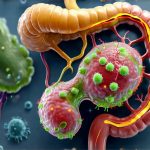The human gut is an incredibly complex ecosystem, home to trillions of microorganisms – bacteria, fungi, viruses, and others – collectively known as the gut microbiota. This community plays a crucial role in overall health, influencing digestion, immunity, mental well-being, and even chronic disease risk. Increasingly, research highlights that the diversity within this microbial community is a key indicator of gut health, and diet stands out as one of the most powerful factors shaping it. A monotonous diet can lead to a less diverse microbiome, while a varied and rich dietary pattern promotes a thriving, resilient ecosystem.
Understanding how different food choices impact the composition and function of our gut microbiota allows us to make informed decisions that support long-term health. It’s not simply about avoiding “bad” foods or focusing solely on “superfoods”; it’s about embracing a broader spectrum of edible plants and fermented items, acknowledging the symbiotic relationship between ourselves and the microbes within. This article will explore the profound impact of diet diversity on gut health and offer insights into cultivating a more robust microbial landscape.
The Connection Between Diet & Gut Microbiota
The food we consume directly fuels both our bodies and the microorganisms residing in our digestive tract. Different types of carbohydrates, fats, proteins, and micronutrients support different microbial populations. A diet lacking variety limits the resources available to these microbes, potentially leading to a decrease in overall diversity. Conversely, a diverse diet provides a wider range of substrates for fermentation, fostering a more balanced and resilient gut ecosystem.
This dynamic interplay isn’t just about feeding the bacteria; it’s also about creating an environment where beneficial species can thrive while limiting the growth of potentially harmful ones. Dietary fiber, in particular, is crucial as humans lack the enzymes to digest it directly but many gut microbes can ferment it, producing short-chain fatty acids (SCFAs) which have numerous health benefits.
The Benefits of a Diverse Gut Microbiome
A diverse microbiome isn’t just about having more species; it’s about having the right species in the right balance. A rich microbial landscape enhances our ability to digest food, absorb nutrients, and synthesize essential vitamins. It strengthens the intestinal barrier, preventing “leaky gut” syndrome, and modulates the immune system, reducing inflammation and bolstering defenses against pathogens.
The Role of Fiber & Plant-Based Foods
Dietary fiber is a cornerstone of gut health and diversity. Different types of fiber – soluble, insoluble, resistant starch – are fermented by different microbial species, promoting a wider range of beneficial metabolites. Plant-based foods, beyond just fiber, provide polyphenols, prebiotics (food for microbes), and other compounds that further support microbial growth and function. Increasing intake of fruits, vegetables, whole grains, legumes, nuts, and seeds is arguably the most impactful dietary change you can make for gut health.
Fermented Foods & Probiotic Potential
Fermented foods such as yogurt, kefir, sauerkraut, kimchi, kombucha, and miso are naturally rich in live microorganisms (probiotics). While not all fermented foods contain viable probiotics in significant quantities after processing or storage, they often contribute to microbial diversity by introducing new strains into the gut. They also provide substrates that can nourish existing beneficial bacteria. It’s important to note that probiotic effects are strain-specific and may vary from person to person.
Minimizing Processed Foods & Artificial Additives
Highly processed foods, characterized by refined sugars, unhealthy fats, and artificial additives, often negatively impact gut health. These foods tend to promote the growth of less desirable microbial species while suppressing beneficial ones. Emulsifiers, artificial sweeteners, and other food additives can disrupt the gut barrier and alter microbial composition. Reducing consumption of these items supports a healthier environment for your gut microbes.
Ultimately, cultivating a diverse gut microbiome is an ongoing process that requires consistent dietary choices. It’s about moving beyond restrictive diets and embracing a holistic approach to nutrition that prioritizes whole, unprocessed foods, fiber-rich plant matter, and potentially incorporating fermented food options. Small changes can accumulate over time, leading to significant improvements in gut health and overall well-being. Focusing on gradual adjustments and finding sustainable habits is far more effective than attempting drastic dietary shifts.


















